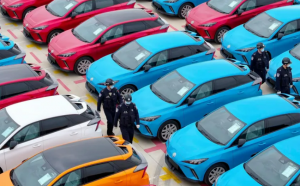Chinese car companies have called on Beijing to hit European Union rivals with import taxes of up to 25% if the trading bloc imposes tariffs on vehicles from China, the country’s state media has reported.
The demand was reportedly made at a closed-door meeting organised by China’s Ministry of Commerce, which was also attended by representatives of European car firms.
The measures would target cars from the EU with large petrol-driven engines.
Last week, the EU threatened Chinese electric vehicle (EV) makers with tariffs of up to 38% from 4 July.
The meeting in Beijing was attended by four Chinese and six European car companies, according to an article published by a social media account affiliated with state broadcaster CCTV.
German car making giant Volkswagen has confirmed to the BBC that it was present at the meeting but declined to comment on what was discussed.
Other European companies that were reportedly present, including BMW and Porsche, did not immediately reply to the BBC’s requests for comment.
“China’s car companies called on the government to adopt firm countermeasures against the EU,” the report said.
“It is suggested that within the limits allowed by Word Trade Organization rules, a higher provisional tariff be imposed on large-displacement petrol vehicles imported from Europe.”
The reports echo an article published last month by the state-run newspaper Global Times, which said 25% tariffs should apply to cars with petrol engines larger than 2.5 litres.
The move would target “luxury or ultra luxury” vehicles, meaning “an additional tax is not likely to make much of a difference on volumes,” Bill Russo, from advisory firm Automobility, told the BBC.
Why the EU might be about to make Chinese electric cars more expensive
The EU’s governing European Commission (EC) announced last week that it had “provisionally concluded” that Chinese EV manufacturers will face tariffs “should discussions with Chinese authorities not lead to an effective solution”.
Firms that co-operated with the investigation, which was launched in October, will face an average 21% duty, while those who did not could face one of 38.1%.
These charges would come on top of the current rate of 10% tariff levied on all electric cars produced in China.
The EU’s intervention comes after the US made the much bolder move of raising its tariff on Chinese electric cars from 25% to 100% last month.
The Chinese government has denounced the decisions as protectionism and has since started taking retaliatory measures.
Earlier this week, China launched an investigation into imports of European pork products.
BBC

